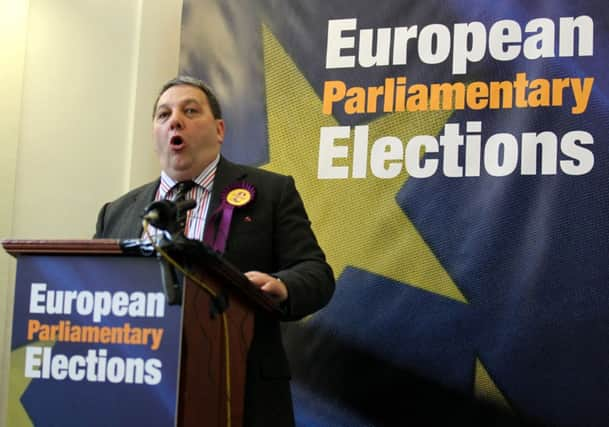Leaders: Time to accept Ukip may have struck chord


Scotland doesn’t do Ukip, everyone was told during the campaign. A party led by a very English and very mouthy bloke? A party with nasty attitudes towards immigrants? A party that attracts nutcases and fruitcakes? Of course, Scots don’t do that, because Scots have strong senses of fairness, compassion, and social justice, values that those south of the Border seem to have forgotten.
So why did Ukip manage to persuade one in ten of those who voted last week to back them? According to Labour, it is because Alex Salmond made the mistake of talking too much about Ukip, sending the subliminal message that the party was important and might actually win something.
Advertisement
Hide AdAdvertisement
Hide AdSNP strategists have a different view, blaming the media for giving Nigel Farage far too much publicity. Really? So journalists should censor anyone of whom the government does not approve? Or deny space to anyone who dares to challenge the conventional received wisdom, say, that Scots are inherently fair, compassionate and socially just?
Perhaps there is another explanation. Perhaps it is that Ukip was saying things that a surprisingly large number of Scots agreed with.
Perhaps it was expressing opinions that no other party in Scotland holds and that those who voted for Ukip were pleased to have the chance to endorse.
These are disquieting thoughts. Yes, it is true that the 10 per cent of the vote Ukip secured was on a small turnout. The numbers can be re-worked to claim that actually, the party is only backed by about 4 per cent of the electorate and so can be ignored. That, however, is not how democracy works.
Indeed, there is evidence that Ukip’s policies are backed by a lot more Scots than bothered to vote. An opinion poll conducted earlier this year for Dundee University’s Five Million Questions project found that just under seven out of ten Scottish voters backed Ukip’s demand for stricter immigration controls.
Six out of ten agreed that welfare benefits should only be paid to those who have been resident here for five years, just over half wanted overseas aid budgets cut, and a quarter wanted to see Scotland out of the EU. These are all Ukip policies. So here’s a radical thought – those Scots who voted for Ukip did so because they agree with it.
Yes, it is still a minority. But both the SNP and the Lib Dems were once similar minorities and now they are parties of government. Perhaps it is time the mainstream parties took a good look at themselves, at the mood and attitudes of the electorate, and asked themselves whether they really are in tune with public opinion.
Tram expansion plans on the line
NO SOONER are Edinburgh’s trams running than council chiefs are talking enthusiastically about extending them. It’s a “no brainer” apparently.
Advertisement
Hide AdAdvertisement
Hide AdWhat? Actually, the trams aren’t running for fare-paying passengers quite yet. And the trialling period has been dogged by all sorts of problems – breakdowns, badly parked vehicles obstructing the tracks, even lightning strikes.
The average citizen may well think that this promised trouble-free way of zipping thousands of people between the city centre and the airport has yet to prove itself. Indeed, they are likely to reckon that the councillors who already seem to be mentally laying tracks southwards between Princes Street and Edinburgh Royal Infirmary are the “no brainers”.
Expansion of the tram system at some point in the future does make strategic sense. But have they forgotten that the track due to open on Saturday is about four years late, about 50 per cent over budget, and about half the length intended? Do they not recall the damage caused to businesses and livelihoods by the construction?
It is of course possible that the tramline will be a great success, both in carrying people and in stimulating new business. It is also possible that Edinburgh’s people will come to love the tram and discount all the construction disruption as a price worth paying.
But let’s see if that happens first. And then let’s see some detail of what a southern extension involves. Let’s also see some cast-iron guarantee of how costs will be controlled, building timetables kept, and disruption restricted to an absolute minimum. That, surely, is the “no-brainer”.